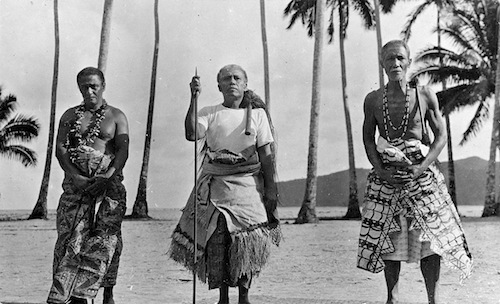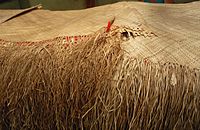The Samoans, one of the largest Polynesian populations in the world, cherish the importance of storytelling and tradition by appointing a select family member as an orator chief, known as a “tulafale.” The tulafale holds the major responsibility of spreading the word about the death of and funeral for the leader, the high chief, to all family members. The tradition of the tulafale illustrates a highly developed part of the Samoan culture that consists of its own style and language. This high development traces back to the days before the arrival of the missionaries, when all communication was transmitted orally.
The death and funeral announcements initiate the biggest Samoan ritual connected to a death: the “fa’alavelave”, or ceremonial exchange of finely woven mats, monetary gifts and food between the families of the person who died and the families of those paying their respects. The importance of mats harkens back to when they served as the currency of the Samoan people. Nowadays, these mats act mainly as decorations during the funeral and then are stored away. When a big funeral happens, orators and their mourning family members should directly receive mats and food as forms of reciprocation for their gifts. The Samoans value the mats so much that the most important ones bear honorable names.
Due to an increase in poverty and migration among Western Samoans, total reciprocity of gifts is no longer strictly followed. Now, family members often remain in the homeland, and migrant members send them money. When these migrant members attend a funeral in their homeland, they will pay to get there and bring a good amount of money with them. Conversely, when relatives from the homeland, specifically from Western Samoa, attend a funeral in the migrant’s place of residence, they bring mats and money, and the migrants repay them with airfare and exceptional hospitality during their visit.
For a Samoan to be chosen as a respected tulafale, he or she participates in a special ceremony called a “saofa’i”, which happens only when the family discusses and comes to a consensus. This extensive process marks the formality of the situation with the acceptance of a new titleholder as well as a possible tulafale into the family and village. The select circle of orators and chiefs gather together to share speeches, recite genealogies, consume a popular plant called kava and finish the process by celebrating with a feast prepared by the new member’s family.
More from Cultural Perspectives:

 The Tulafale’s Role: Samoan Oratorial Traditions for Death and Funeral
The Tulafale’s Role: Samoan Oratorial Traditions for Death and Funeral




 Forest Bathing Eases Grief by Soaking in Nature
Forest Bathing Eases Grief by Soaking in Nature

 Meaning-Focused Grief Therapy: Imaginal Dialogues with the Deceased
Meaning-Focused Grief Therapy: Imaginal Dialogues with the Deceased















Thank you so much for the extensive info.
Report this comment
What’s with the custom of washing the body every 6 months from the grave. Who’s responsibility is it to have this be done?
Report this comment
i wush fr mor information twas very short
Report this comment
Plesse could you send me this copy
Report this comment